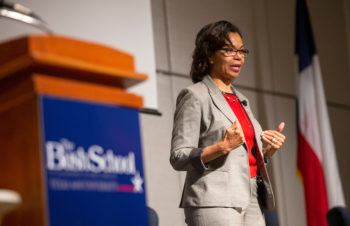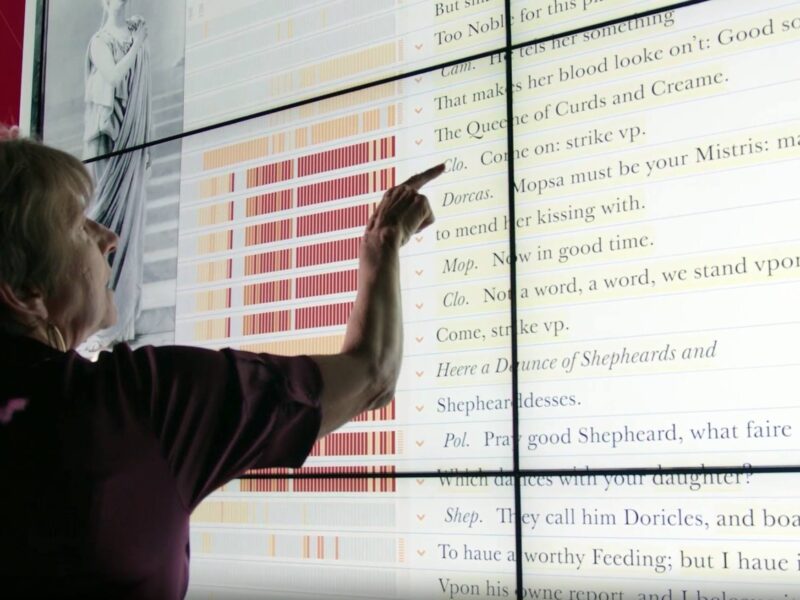Women Are Facing Critical Issues And Need To Be Heard, Symposium Leaders Say
Women need to empower themselves and their voices need to be heard as the world faces critical issues in the 21st century, speakers said Friday at the 5th annual Texas Women, Peace, and Security Symposium at Texas A&M University.
Sponsored by the Bush School of Government and Public Service, the Compton Foundation, the National Archives Foundation, Unilever, Pivotal Ventures and the Carl M. Freeman Foundation, the symposium addressed the links between women, development and national security.
Keynote speaker Ambassador Gina Abercrombie-Winstanley, co-founder of the Leadership Council for Women in National Security, said there were times when the very presence of women in a leadership role “meant instant dismissal. It tended to breed self-doubt, and you were defeated before you even began.
“Being underestimated can actually be a benefit because you are challenged and you can rise to the task. We know now that if you always bring the same people to the table, you will get the same results.”
She said that women have made significant progress in security issues, but not enough.
“Only 5 of 57 key defense positions in the U.S. are held by women, less than 8 percent of the flag officers in the military are women, only one-third of the positions in the State Department are held by women, and the list goes on and on,” she said.
Abercrombie-Winstanley, who has had a 30-year career in diplomacy, said that women have had different experiences than men and these different perspectives should be taken into account.
“Our voices need to be heard,” she said. “And we must not only think outside the box, we must broaden the box itself. We must teach and mentor each other.”
Abercrombie-Winstanley was the longest serving U.S. ambassador to the Republic of Malta, and also played a key role as the Secretary of State’s Special Assistant for the Middle East and Africa, and was the first woman to lead a diplomatic mission to the Kingdom of Saudi Arabia.
She noted that a career in diplomacy is not easy, but it is fulfilling “because you know that you are working in public service, you are needed and on top of that, it is an amazing life.”
During a panel discussion on Global Development and Economic Empowerment, former Texas A&M President Elsa Murano, now the director of the Norman Borlaug Institute for International Agriculture, stresses that the scarcity of water – especially in Africa – is creating life-threatening issues for millions of people.
She said that a lack of water from droughts, institutional failures and lack of infrastructures prevents Africa from having enough food.
“We must have a way to deliver water to where it is needed, and that means irrigation,” Murano said.
“We need to deliver water to the fields, and it must not be wasted, which often is a big problem,” she said.
“It all comes down to water means peace. Norman Borlaug said it best: “Peace cannot be built on empty stomachs.”
Murano said that in Africa, many of the decisions about water are made by men, but most of the farmers are actually women. To have water, most women must spend about five hours each week hauling water to their homes by buckets, and they carry from 44 to 100 pounds of water every day.
“This shows the physical barriers women face and why they very much need powered pumps to supply their water,” she said.
Catherine Bertini, executive director of the World Food Program, said that she has spent much of her career trying to improve the efficiency and operations of organizations that are serving poor and hungry people in the U.S. and around the world. She expanded the electronic benefit transfer options for food stamp recipients among other humanitarian efforts.
She won the 2003 World Food Prize which prompted her to create the Catherine Bertini Trust Fund for Girls’ Education to increase opportunities for girls and women to attend school.
“In so many countries, it is important for food to go from Point A to Point B, and most of the time, women play a key role in this,” she said. “There are way too many countries in the world that are cut off from adequate food supplies.”
Other panels included discussions on new research on women, peace and security; Texas perspectives on women, development and security; and political and economic issues facing women.
Media contact: Keith Randall at (979) 845-4644 or keith-randall@tamu.edu






